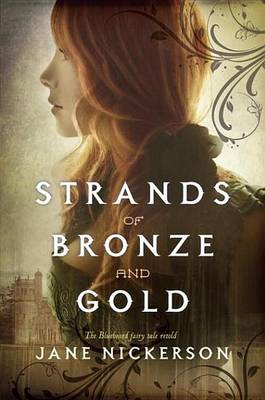Reviewed by Briana @ Pages Unbound on
Sophie could be either immediately endearing or annoying, according to readers’ perspectives. She rambles from the moment she meets her godfather, explaining she is not normally so chatty but simply overwhelmed by her new surroundings. Her chattering never stops, however, even as she must be growing used to her new home, even when she meets other new people. Considering Sophie is often alone in the mansion, shut away from interactions with anyone other than her godfather, her talking may be both a coping mechanism for herself and for the readers, who barely meet any other characters, as well. In the end, however, her ramblings often make her seem rather silly.
Of course, some level of silliness is a prerequisite for the protagonist of this story. She has to walk a line between being foolish enough to become entangled in her godfather’s trap and smart enough to have some chance of getting out of it—and to keep readers for giving her up as a hopeless cause. Sophie manages this pretty well, even commenting once to the effect of, “I’ve always wondered how characters in stories could foolishly get themselves in such troubles. Now I know.”
The plot Sophie enters is at some times obvious and at others deliciously creepy. Her godfather’s obsession with her, due to his age, is one of level of disturbing. Sophie’s supernatural encounters with the dead are another. The story of the ghosts could have been more fleshed out, but mostly it seems intended as an eerie backdrop for the readers and a convenient warning mechanism for Sophie—one to which she often fails to pay any heed.
The story’s greatest strength lies in Sophie’s self-reflection. As she spends increasing time in her godfather’s world, she begins to realize she is losing her sense of self. She is abandoning her values because someone else has told her they do not matter, or because there is no one around to see whether she is behaving appropriately or not. Sophie realizes morality and identity are what she does even when no one is watching. Such moments of Sophie’s thoughts and self-evaluation are sprinkled throughout the book and can encourage readers to think more about their own ideas on principles and identity.
The book’s obsession with morality also leads to its greatest weakness, however. The book is set in the 1800s in the American South. Meaning slavery. Meaning Sophie is the cliché character who stands firm against this atrocity even as all the other characters accept it. The desire behind this characterization is understandable, even commendable. It would be difficult for modern readers to completely back a character who unequivocally approves of or even encourages slavery—but they could accept someone whose views more nuanced, caught between the passion of a cruel overseer and the zeal of a Underground Railroad conductor. Authors do a disservice to historical fiction and historical figures by vilifying characters who promote anything modern society opposes–whether slavery, segregation, anti-feminisim, etc.—and ensuring their protagonists are all outspoken advocates of modern values. Today’s readers basically agree slavery is wrong. We do not need fictional characters self-righteously throwing the fact in our faces. We can handle more complexity in characterization. We will not all turn on Sophie if, instead of raring to free all the slaves she can find, she admits her views on slavery are a little more confused.
Interestingly, the other characters do tend to be more nuanced. The house’s servants and slaves are somewhat one-dimensional, background characters who exist to drive the plot or Sophie’s own characterization. Her godfather, however, is quite complex, experiencing a wide range of moods and desires. A character Sophie meets in secrecy also has more complicated views of the world and of right and wrong.
Strands of Bronze and Gold is a fresh addition to the retold fairy tale market. It has its flaws, mostly in under-development of plotlines and minor characters, but the originality of its subject matter and its tendency to ask weighty questions of both characters and readers make it a worthwhile read for those who appreciate retold fairy tales, imaginative historical fiction, or a little darkness in their YA.
Reading updates
- Started reading
- 6 June, 2013: Finished reading
- 6 June, 2013: Reviewed
